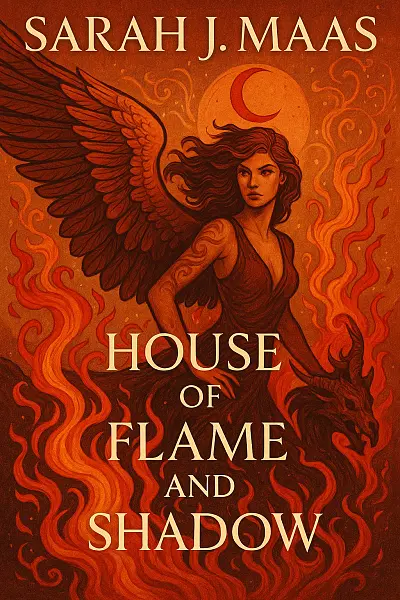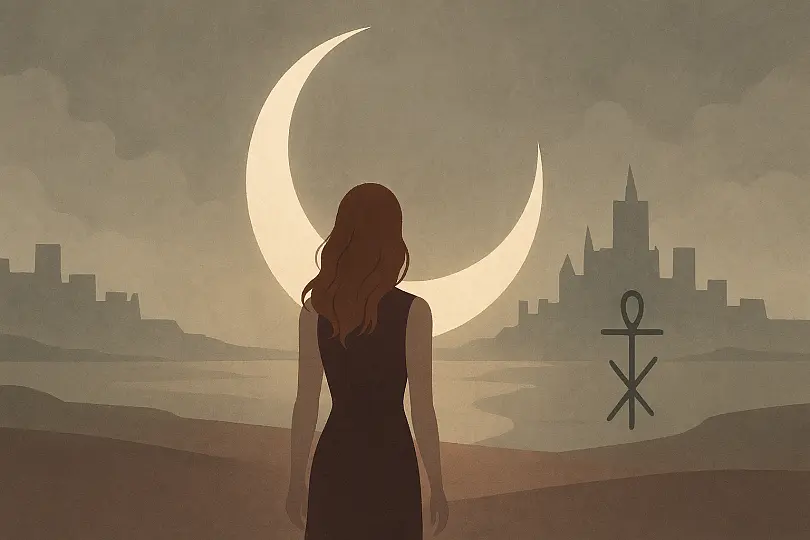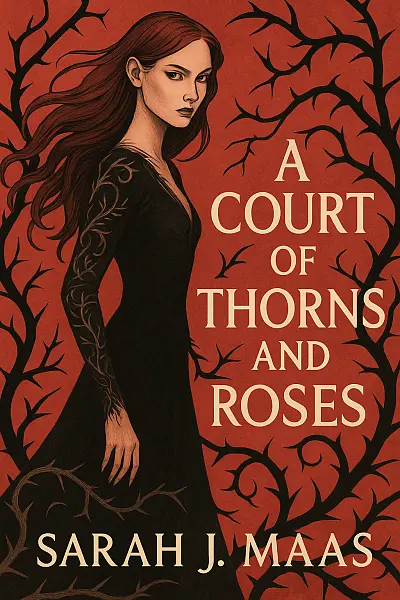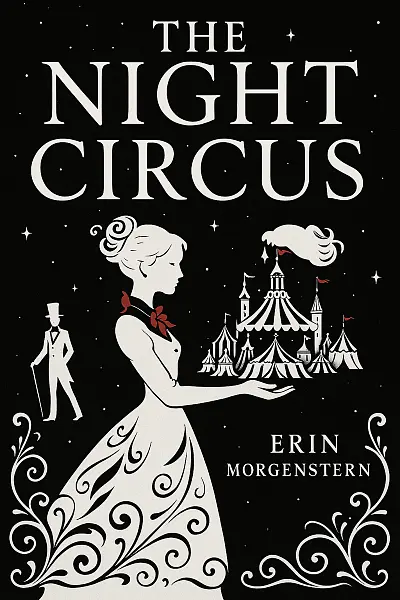
House of Flame and Shadow
by: Sarah J. Maas
Bryce Quinlan is desperate to return home to Midgard, where her heart and the people she loves are at stake. Thrust into an unfamiliar realm, she’s determined to outwit powerful forces and find a way back—but trusting anyone could mean disaster. When Hunt Athalar is locked away by the Asteri, stripped of autonomy as Bryce’s fate hangs in the balance, the pressure mounts.
Their worlds teeter on the edge of ruin, tangled in high-octane danger, sizzling romance, and hard choices. Sarah J. Maas amps up the tension with fast-paced action, witty banter, and that “will they or won’t they?” chemistry you can’t help but root for.
""In darkness and fire, we discover which parts of ourselves are worth saving—and which we must let burn.""
Let's Break This Down
The Author's Voice
Atmosphere
- Think rich, magical, and unapologetically grand. The worldbuilding is flashy and layered, filled with urban fantasy glamour, touches of romance, and bursts of shadowy danger.
- There’s a lush sense of immediacy—you feel the rush of crowded city streets, the intensity of secretive halls, and the weight of supernatural politics around every corner.
- The mood swings between darkly seductive and fiery, high-stakes adventure, keeping you constantly on your toes.
Prose Style
- Expect vivid, sensory-heavy descriptions that can feel almost cinematic. Maas doesn’t shy away from embellishment—she paints every emotion and setting with bold strokes.
- Dialogue is snappy, fast-paced, and full of sass; characters wear their hearts (and snark) on their sleeves.
- Inner monologues run deep—sometimes bordering on indulgent—providing intense emotional insight, but occasionally slowing the momentum.
- Descriptive language tends to favor modern slang and irreverence, giving the narrative a unique, punchy tone that stands out in the fantasy genre.
Pacing
- The pace is a rollercoaster: furious bursts of action and heart-thudding cliffhangers are balanced by meatier, introspective lulls.
- Maas loves to tease big reveals, stretching tension across chapters for maximum payoff, which can both hook you and, at times, test your patience.
- Early chapters lean into character drama and world-building detail, while the second half speeds toward explosive climax after climax.
- Perfect for readers who crave adrenaline-fueled turns and don’t mind a few slower, emotional pauses that let you catch your breath.
Character Development
- Characters are passionate, flawed, and always evolving. Emotional growth is as important as external stakes here—expect lots of introspection and relationship drama.
- Secondary cast members shine brightly (sometimes even stealing the spotlight), adding depth and humor to the narrative.
- The intensity of bonds—friends, foes, and lovers alike—drives much of the plot, making the ensemble dynamic feel authentic and emotionally charged.
Themes & Overall Mood
- Power, loyalty, sacrifice, and found family take center stage, explored through steamy romance, dangerous magic, and hard-won friendships.
- The tone is unabashedly epic but never afraid to dip into raw vulnerability—expect your heartstrings to be tugged (if not yanked).
- For fans of drama-soaked fantasy packed with emotion, jaw-dropping twists, and a rich mix of light and darkness, this book totally delivers.
Key Moments
-
Bryce Quinlan literally falls into a new world—cue jaw-dropping multiverse crossover vibes
-
Hunt and Bryce’s will-they-won’t-they tension ignites even as destinies hang by a thread
-
Shock revelation: Classic Maas—no one is safe, alliances shatter, and secrets burn brighter than the Asteri
-
Intoxicating banter & ferocious loyalty—the core squad keeps you rooting for every impossible choice
-
High-octane battle scenes where magic is as destructive as any emotion unleashed
-
That harrowing mirror scene: guilt, hope, and sacrifice crash together in pure Maas heartache
-
Fae, angels, rebels, and gods collide—power struggles that explode genre boundaries and set up epic consequences
Plot Summary
House of Flame and Shadow picks up right where the previous Crescent City book left off, with Bryce Quinlan stranded in a strange and dangerous new realm—Prythian, the world of the A Court of Thorns and Roses series. As Bryce grapples with unfamiliar magic and allies, she desperately searches for a way home to save her friends and stop the demonic threat invading Midgard. Meanwhile, Hunt Athalar is imprisoned, tormented by uncertainty about Bryce’s fate and how to escape. Major twists unfold as Bryce discovers shocking secrets about her heritage and forms uneasy alliances with characters from another universe, leading to a climactic confrontation with the Asteri that threatens both worlds. By the end, sacrifices are made, true loyalties are revealed, and Bryce finds a new sense of belonging, setting the stage for future stories.
Character Analysis
Bryce Quinlan is fiercely loyal and fiercely flawed—a heroine who balances vulnerability and strength as she navigates heartbreak, identity crises, and cosmic stakes. Hunt Athalar, struggling with captivity and loss, evolves from a protector to an equal partner, overcoming his own trauma and guilt. Supporting players like Ruhn Danaan, Ithan Holstrom, and the crossover cast from Prythian (including Feyre and Rhysand) each grapple with conflicting loyalties, duty, and personal growth. Throughout the novel, characters are consistently forced to confront their deepest fears and desires, resulting in meaningful—if sometimes melodramatic—development that resonates strongly with readers.
Major Themes
At its heart, the book explores the search for belonging—both in terms of found family and reconciling one’s true self. Sacrifice and redemption feature heavily, with several characters confronting the consequences of past mistakes and risking everything for those they love, most notably Bryce risking her life for both worlds. The story also tackles the abuse of power and resistance against oppression, especially in the ways the Asteri manipulate and control the people of Midgard. Through interdimensional alliances and personal choices, Maas prompts readers to consider the themes of unity, hope, and what makes a hero.
Literary Techniques & Style
Sarah J. Maas leans into her signature blend of lush, sensory descriptions and snappy, emotional dialogue, keeping the story intense and personal despite the high stakes. She uses dual perspectives and jump-cuts between worlds to build suspense and deepen the plot. Throughout the novel, symbolism—notably fire and shadow—mirrors the characters’ internal and external battles, while metaphors about light, darkness, and thresholds recur to underscore transformational moments. Although the prose is sometimes overwrought, Maas’s pacing and worldbuilding are immersive, pulling readers into every twist.
Historical/Cultural Context
Set in the magically advanced urban landscape of Crescent City and the fantastical world of Prythian, the novel draws on both contemporary culture (with its mash-up of technology and myth) and traditional high fantasy elements. The crossover taps into the current literary trend of multiverse stories and shared universes, reflecting readers’ appetite for interconnected narratives and complex worldbuilding. Social hierarchies, prejudices, and the struggle for empowerment encountered by the characters parallel real-world issues, anchoring the fantasy in relatable themes.
Critical Significance & Impact
House of Flame and Shadow is a bold entry in the Maas universe, celebrated for its epic scope, emotionally satisfying character arcs, and ambitious crossover. It has divided critics and fans over its layered plot and intense romantic drama, but it cements Maas as a leading voice in modern fantasy fiction. The book’s influence reaches far beyond its genre, sparking discussions about genre-blending, gender roles, and the power of intertextual storytelling in contemporary literature.

Power, sacrifice, and secrets ignite a war between realms and hearts
What Readers Are Saying
Right for You If
If you live for epic fantasy worlds, romantic tension that borders on addictive, and books that basically dare you to pull an all-nighter, then House of Flame and Shadow is totally your jam. This is such a fun pick for anyone obsessed with intricate magical systems, sassy banter, and those sprawling cast-of-characters stories where you need a spreadsheet to keep track (and you secretly love it).
Honestly, Sarah J. Maas fans? Don’t even hesitate, just dive in. If you devoured Crescent City or A Court of Thorns and Roses, this one goes straight to the TBR pile. You get high-stakes drama, wild plot twists, and allll the intense emotions Maas is famous (or infamous?) for. And if you’re really into slow-burn romance that eventually sets the page on fire, trust me, it delivers.
But—if you’re a reader who wants super focused plots without detours, or you get frustrated by pages and pages of world-building, this book might feel like a bit of a slog. It’s huge, intricate, and sometimes a little over the top with the melodrama. If you’re not a fan of multiple POVs, or fantasy romance isn’t your thing, you’ll probably want to skip it.
So, bottom line:
-
Read this if you love:
- Fantasy with big, bold magic
- Sprawling ensemble casts
- Romance that’s angsty but fun
- Series where jumping in means hours (and hours) of investment
-
Maybe skip it if you prefer:
- Breezy standalones
- Streamlined plots and minimal fluff
- More grounded, realistic stories
- Low drama, low magic worlds
Basically, this book is for anyone who wants to get absolutely lost in a magical, messy, emotional world for a while—and has the patience (and snacks) for a chunky read.
What You're Getting Into
Get ready for an electrifying ride in House of Flame and Shadow by Sarah J. Maas!
Bryce Quinlan finds herself hurled into a world more dangerous—and mysterious—than ever before, forced to navigate treacherous alliances and long-buried secrets while desperately fighting for a chance to return home. Meanwhile, Hunt Athalar faces the fallout of powerful forces closing in, where every move could mean the difference between survival and devastation for everyone he loves. With heart-pounding stakes, sizzling tensions, and that trademark Maas blend of fantasy and emotion, this book promises jaw-dropping twists and a nonstop, high-stakes adventure that will leave you breathless!
Characters You'll Meet
-
Bryce Quinlan: Spirited protagonist who’s torn from her world and thrust into a realm beyond comprehension. Her determination to find her way back and protect those she loves drives much of the high-stakes action.
-
Hunt Athalar: The formidable angel and Bryce’s complex love interest. Struggling with his identity and loyalties, Hunt’s arc centers on sacrifice, freedom, and navigating his feelings for Bryce.
-
Ruhn Danaan: Bryce’s loyal half-brother, whose blend of vulnerability and strength grounds the group. Ruhn faces tough choices about his alliances and the nature of his own power.
-
Ithan Holstrom: A devoted friend wrestling with grief and self-doubt. Ithans’ journey explores belonging and trust as he steps into a more pivotal role among their allies.
-
Cormac Donnall: A fae with ties to many secrets, navigating loyalty and loss. His motivations keep readers guessing, injecting the plot with plenty of intrigue.
More Like This
If House of Flame and Shadow lit up your imagination, you’ll absolutely vibe with the blend of multiverse drama, high-stakes romance, and complex mythologies that fans of A Court of Thorns and Roses already adore. The way Maas builds intricate worlds and crafts slow-burn relationships has a lot in common with Cassandra Clare’s The Mortal Instruments—especially the way both authors intertwine secrets, destinies, and supernatural politics, making every moment feel charged and every alliance suspect.
What’s more, the sweeping urban-fantasy energy and snappy dialogue might remind you of the adventure-packed twists of The Witcher (as seen on Netflix). There’s a similar intensity—magic clashes with modernity, legends smash into present-day dangers, and characters must constantly question whom to trust. The result is a reading experience that feels just as addictive and binge-worthy as your favorite TV epic, but with Maas’s signature, emotionally-driven prose that hooks you right from page one.
Critic's Corner
What does it mean to belong when your very reality can shatter in an instant? With House of Flame and Shadow, Sarah J. Maas dares readers to consider how identity and loyalty morph when the known world dissolves beneath our feet. Through Bryce Quinlan’s displacement and Hunt Athalar’s confinement, the novel probes the resilience of love, the agony of exile, and the ferocity of hope—a heady cocktail that feels both timely and timeless in today’s fractured world.
Maas’s writing whirls with cinematic energy, propelling the reader through thickly layered action scenes and sultry, crackling dialogue. She expertly dials up the tension, wielding perspective shifts and cliffhanger chapter endings to keep the pace both breathless and addictive. The language is lush without tipping into overwrought, balancing vivid sensory worldbuilding with sly touches of humor that humanize even the most supernatural characters. Descriptions shimmer: new realms are sketched with a deft brush, while emotional moments land with genuine weight. Where Maas shines brightest, though, is in the pulse-quickening push and pull between her leads. The chemistry and emotional complexity between Bryce and Hunt deepen, building on previous installments yet refusing to settle for anything static or safe.
Beneath the propulsive plot, House of Flame and Shadow digs into themes of agency, sacrifice, and the perilous nature of trust. Maas explores not just what we fight for, but why we fight—and how love, in all its forms, becomes both shield and sword when institutions fail. The narrative interrogates power and its corruptibility—a timely resonance in a world rife with fractured authority and moral ambiguity. Through Bryce’s journey, the novel questions the cost of returning home and the danger inherent in nostalgia, suggesting that true belonging may require painful transformation. Cultural touchstones echo throughout: found family as resistance, the intensity of chosen kinships, and the consequences of systemic oppression all pulse just beneath the surface, lending surprising gravity to even the book’s most glamorous escapades.
Within the sprawling tradition of urban fantasy, Maas asserts herself as both inheritor and innovator. Readers of Cassandra Clare and Leigh Bardugo will recognize the intoxicating cocktail of romance and peril, but Maas amplifies these pleasures with expansive, interwoven mythologies and a willingness to let her heroes fail spectacularly. The Crescent City series, now three books deep, displays a bold willingness to stretch the boundaries of its own universe—the kind of ambitious risk-taking that sets modern fantasy apart from its predecessors.
Of course, with such ambition come pitfalls: the intricacy of subplots occasionally outpaces clarity, leading to moments where emotional beats feel diluted or characters risk becoming archetypes. Yet when House of Flame and Shadow soars, it’s with unapologetic heart and dazzling confidence. For readers craving fantasy that embodies both mythic grandeur and bruised vulnerability, this book is an undeniable, exhilarating ride—flawed, ferocious, and utterly unputdownable.
Community Thoughts
okay but that scene with Hunt in the rain? chills. I kept rereading it because the emotion just HIT, and now every storm makes me think of him. Maas really knows how to haunt you with a single character.
honestly, that one moment when Hunt’s fate hung in the balance? I had to put the book down and just STARE at the wall. Maas knows how to wreck me in a single scene.
why did i think i could read just one more chapter? baxian’s choices haunted my dreams and i couldn’t put the book down. i regret nothing but my lack of sleep. maas, you got me again.
WHEN HUNT ATALAR SHOWED UP, my heart did a weird little flip. The tension in every room he enters is UNREAL. I kept rereading his scenes just to feel that rush again. Maas, you made him unforgettable.
I swear, House of Flame and Shadow had me up until 3 AM just thinking about Hunt and his impossible choices. Maas, why must you torment us with these cliffhangers? My sleep schedule may never recover.
Leave Your Review
Local Take
Why It Matters
House of Flame and Shadow by Sarah J. Maas totally strikes a chord with readers here, especially because:
- Power & Rebellion: Oh wow, the way Maas explores resistance against oppressive forces immediately brings to mind local historical struggles—think of those times communities banded together to fight injustice.
- Found Family: The book’s focus on choosing your own family perfectly matches our cultural value of deep, loyal friendships, which often matter just as much as blood ties in everyday life.
- Identity & Self-Discovery: Themes of self-acceptance and forging your own path echo so many local coming-of-age stories—both in classic literature and those modern tales everyone devours.
- Clashing Values: The romantic freedom and personal agency the characters chase can sometimes clash with more traditional expectations here, sparking big debates (especially around gender roles and independence!).
If you love stories that mash up magical worlds with real-life social dilemmas and emotional journeys, Maas’s series just might feel hauntingly relevant—and challenge what you thought you knew about heroism and belonging.
Food for Thought
Controversies
House of Flame and Shadow has sparked debate over Sarah J. Maas’s representation of diverse cultures and marginalized groups, with some readers criticizing the portrayal as lacking depth or relying on stereotypes. Additionally, there’s ongoing discussion regarding Maas’s writing style, particularly the use of repetitive internal monologue and explicit content, which some feel detracts from character and plot development.
Like what you see? Share it with other readers







